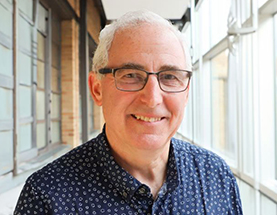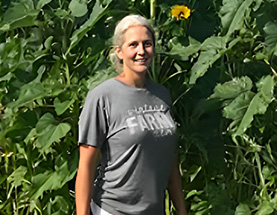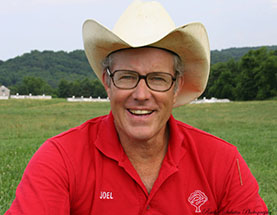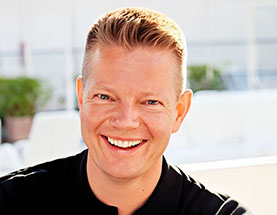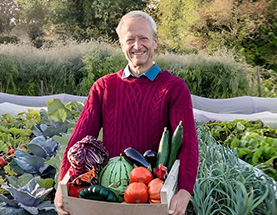Discover Surviving Hard Times
Surviving Hard Times

Surviving Hard Times
Author: Richard Jacobs
Subscribed: 2Played: 137Subscribe
Share
© 2022
Description
It's one thing to listen to doom and gloom about
food and fertilizer shortages, skyrocketing prices,
the cost of living, or your job being outsourced
overseas or eliminated due to automation.
It's another thing to hear practicable, immediately
actionable advice from experts who can help you reduce
the fear, anxiety, and burden of these problems.
Tune in now to the Surviving Hard Times Podcast with
Richard Jacobs.
food and fertilizer shortages, skyrocketing prices,
the cost of living, or your job being outsourced
overseas or eliminated due to automation.
It's another thing to hear practicable, immediately
actionable advice from experts who can help you reduce
the fear, anxiety, and burden of these problems.
Tune in now to the Surviving Hard Times Podcast with
Richard Jacobs.
143 Episodes
Reverse
In this episode, Kelsey Nightingale returns to the podcast to discuss her unique approach to homesteading and organic farming. As a licensed veterinary technician, Kelsey recently relocated with her family to a small homestead in Scottsburg, OR, where they focus on sustainability and living off the land. Kelsey became interested in homesteading in 2019. After taking the plunge in 2021, she and her husband Sean became committed to one mission: to become self-sufficient and unreliant upon society to live… In this conversation, we explore: Why Kelsey and Sean decided to shift their lifestyles. The resources that Nightingale Homestead currently provides. How long it typically takes to become successful in homesteading and small farming. The easy and hard parts of self-sufficiency. Tune in now to discover the inspiring journey of Kelsey and Sean as they embrace a lifestyle deeply rooted in sustainability, self-sufficiency, and a profound connection to the land! Follow along with Kelsey and Nightingale Homestead here. Episode also available on Apple Podcasts: https://apple.co/3bO8R6q
In this episode, Stacy Zivicki from Sustainable Stewards takes the time to chat with us about preparation tactics, sustainable agriculture, and homesteading. Stacy’s mission with Sustainable Stewards is to show her viewers how to achieve authentic self-sufficiency – free from reliance on civilization. On her channel, Stacy covers everything from permaculture to animal husbandry and food freedom. She informs her viewers so that they too can learn how to be independent of feed mills, grocery stores, and our society’s approach to debt. Join us now to hear Stacy discuss: How her background shaped her perspective on self-sufficiency. The importance of becoming your own producer of resources. How Stacy utilizes Community Supported Agriculture (CSA) for her food distribution. The benefits of working with your community to support sustainable agriculture and livestock production. What does true self-sufficiency look like? Tune in to find out! To watch Stacy’s educational content click here, and to purchase Sustainable Stewards merchandise click here. Episode also available on Apple Podcasts: https://apple.co/3bO8R6q
Joining us in this episode is Aaron Dukes from Dukes Legal, P.A. In addition to his work as an attorney, Aaron is also a farmer and cattle ranch owner that has cultivated a successful agricultural and livestock operation. Having the skills needed to raise and grow your own food may very well come in handy during these uncertain times – but what does it take to achieve this level of self-sufficiency? Press play to discover: The intricacies involved in meat production. Why having a substantial stock of food is important as we face supply shortages. How fertilizers are properly used in vegetable farming. Want to get to know more about Aaron Duke and his distinct approach to farming and livestock cultivation? Join this informative conversation now! Episode also available on Apple Podcasts: https://apple.co/3bO8R6q
Today’s world news is prompting more and more people to look into future preparation tactics. If our society takes a turn for the worse, are you ready? Joining us in this episode to discuss the fundamentals of prepping is Jason Charles. Known as “The Angry Prepper” on YouTube, Jason uses his platform to provide his viewers with useful economic survival strategies and unique political insight. In this podcast, you will discover: What you can do to prepare for uncertain times. Situations that could cause mass chaos in cities, and what the timeline for collapse would look like. The importance of stockpiling water and other resources. As tensions rise throughout the United States and the rest of the world, it is more important than ever to be prepared for anything. Those that are paying attention will likely fare much better than those who are not… To watch Jason’s channel for yourself, make sure you subscribe to his Youtube channel! Episode also available on Apple Podcasts: https://apple.co/3bO8R6q
In this episode, we chat with Joe Foster about all things DIY gardening. Joe has a Youtube channel called Growit Buildit, where he provides viewers with thorough information on how to grow their own farms. From garden setup to composting methods, Joe educates people on the foundational principles of self-sufficient living. With the uncertainty that the future holds, these techniques could prove to be very useful for those who take the time to learn them… Join us now to hear Joe discuss: How cheap and easy it can be to start your own garden. The best way to get started with effective composting. How to improve the quality of your soil. Self-sufficient strategies to employ when doing small-scale farming. Want to see Joe’s videos for yourself? Make sure you visit his website and Youtube channel Episode also available on Apple Podcasts: https://apple.co/3bO8R6q
Join Dawn Gallop, the founder of the #9 Farms YouTube channel, on today's episode as she delves into several intriguing topics. As a devoted mother of nine who lives on a sprawling farm, Dawn has been immersed in homesteading long before it became a trend, dating back to 1992. In this episode, Gallop explores the "Pantry Challenge" and shares how it’s affected her life. What exactly does it entail? It revolves around the ingenious idea of utilizing everything stocked in your pantry, food cabinets, and freezer before resorting to purchasing additional groceries. The primary objectives? Saving money, minimizing waste, and igniting creativity in the kitchen! Rather than rushing to the store for more ingredients, embrace the opportunity to experiment with what you already have, potentially uncovering delectable, one-of-a-kind recipes along the way. Moreover, the Pantry Challenge promotes simplicity, time efficiency, and fosters a survivalist mindset. Tune in to discover: Valuable tips, tricks, and pitfalls of the canning process How to differentiate between water-bath canning and pressure canning The shelf life of canned foods (officially and unofficially) The potential health risks of dented cans Gallop’s experience making and selling elderberry syrup (and its anti-viral properties!) Prepare to be enlightened as Gallop shares her wealth of knowledge and experiences in navigating the culinary world with ingenuity and resourcefulness. Interested in learning more? Check out Gallop’s YouTube channel here: http://www.youtube.com/@dawngallop Episode also available on Apple Podcasts: https://apple.co/3bO8R6q
Meet Steven Cornett, the visionary behind Nature's Always Right. After earning his business degree in 2011, Cornett was disenchanted with the corporate world and embarked on a quest for a more fulfilling life. His journey led him to farming, where he unearthed profound insights into health and the American food industry. Discover how cultivating one's food means cultivating health—Cornett believes in the transformative power of nutrient-rich, probiotic-packed produce to heal the body, rendering pharmaceuticals obsolete. From his thriving market garden at the San Diego farmer's market, Cornett champions a grassroots movement. If more people grow their own food, they can revolutionize not just American but global culture, leading to physical and mental well-being. Join us as we delve into: Innovative techniques for crafting homemade fertilizers, inoculants, and pesticides The unparalleled flavor of homegrown vegetables versus store-bought counterparts The alarming trend of micronutrient depletion in soil and its repercussions The four components of compost and strategies for creating microbially diverse compost for vibrant gardens. Ready to cultivate change? Check out Cornett's YouTube channel: My Dream Finally Came True | Welcome to the Homestead (youtube.com). Episode also available on Apple Podcasts: https://apple.co/3bO8R6q
Dive into the innovative world of controlled environment agriculture with Stacy Adams, a distinguished professor of horticulture at the University of Nebraska-Lincoln. Balancing his teaching and extension outreach roles, Adams specializes in greenhouse operations and management within the realm of hydroponics. He sheds light on the challenges commercial shippers face in maintaining product quality throughout distribution and explores strategies to bring hydroponic cultivation closer to consumers, revolutionizing the hydroponic landscape and addressing food security. Tune in to uncover: Insights into the most and least cost-effective fruits and vegetables for hydroponic cultivation The most significant limitations impacting hydroponic operations Exciting advancements in greenhouse design over the past decade and the transformative role of automation in optimizing hydroponic production The nutritional, aesthetic, and flavor differences between field-grown and hydroponic greens Take advantage of this enlightening discussion. Press play now to start on a journey of agricultural innovation. To learn more, visit Stacy Adams | Department of Agronomy and Horticulture | Nebraska (unl.edu). Episode also available on Apple Podcasts: https://apple.co/3bO8R6q
Bringing home a newborn baby is an incredibly exciting time for parents, but it can also be pretty challenging when it comes to breastfeeding. If you’re planning to breastfeed, having a tough time with it, or know someone who is, this episode is for you. Tune in to learn: Why babies are expected to lose about 5% of their birth weight within the first 24 hours of life The protective characteristics of colostrum, and when it should be produced in abundance What proper latching should look and feel like, and why it’s important for the baby Why and skipping feedings slows milk production, and the process of re-lactation Kassi Reyes is a registered nurse specializing in human lactation. With additional training as a lactation consultant and a mother herself, she works both virtually and in person with families who are struggling with the breastfeeding process. Reyes provides online courses and has a lactation-specific YouTube channel with informational videos for families all over the world. She discusses the most common issues parents have when trying to breastfeed, such as poor and/or painful latching, tongue tie in babies, and too much or not enough weight gain in the days following birth. She shares recommendations for re-lactation, how long to breastfeed, and so much more. Visit https://www.kassireyes.com/ to learn more. Episode also available on Apple Podcasts: https://apple.co/3bO8R6q
When Jay’s first baby was born, the hospital staff bottle-fed her against Jay’s wishes; it might seem harmless, but it had a profound and long-lasting effect on her baby’s ability to latch and feed from her breast instead of a bottle. Jay wanted to share her experiences with other mothers who might benefit from the information, and before long, she was invited to be a part of the YouTube Partner Program. She now provides practical breastfeeding education for families all over the world. Tune in to learn: What nipple confusion is and how it can develop Slow-healing nipple infections – how they develop and how to heal them The importance of immediate skin-to-skin contact with your newborn Clogged breast ducts? – How your baby can help! Oversexualization of the breast as a challenge for breastfeeding mothers Benefits of baby-led weaning Why some mothers choose not to breastfeed or discontinue too early What causes mastitis and how to address it Interested in learning more? Check out https://thefamousmommy.com/. Episode also available on Apple Podcasts: https://apple.co/3bO8R6q
When Ammie Harris brought home her newborn son, she quickly realized there was a problem: he wasn’t latching well, and she had a low breast milk supply. Her son was losing weight and she needed to act quickly. The pediatrician recommended a commercial formula, but it didn't work -- not a single commercial formula did -- and her son still wasn’t gaining weight. Then she stumbled upon a controversial article about the benefits of homemade cow’s milk formula. She was scared to try it and unsure about whether she was making the right decision, but having exhausted other options, what else could she do? Within days of trying this homemade formula, her son’s weight was skyrocketing and he was thriving. For anyone interested in using food as medicine, this isn’t an episode to miss. You’ll learn: The recipe for bone broth hot chocolate that’ll be a hit with both kids and adults The practical and important difference between homesteading and living off the grid Whether sunburns are avoidable – an unbelievable story about why Ammie says they are How you can make small improvements to your diet and health even if you have no land to work with Tips for sneaking extra nutrition into your kids’ diet Press play to learn about all this and so much more, and check out Ammie’s YouTube channel at https://www.youtube.com/c/AmmieHarris. Episode also available on Apple Podcasts: https://apple.co/3bO8R6q
The more scientists study traditional agriculture, the less sustainable it seems. Instead, experts are pivoting toward regenerative farming practices, which puts soil health and stewardship first. What are the benefits of regenerative agriculture? Michelle M. Wander, a soil scientist with more than 30 years of experience, joins the podcast to explain… Michelle is the Director of the Agroecology and Sustainable Agriculture Program and Associate Professor of Soil Fertility/Ecology at the University of Illinois. Additionally, she is the Director of the Wander Soil Ecology Lab. As a specialist in agroecology and agricultural sustainability research, she is committed to better understanding the science behind organic farming and ecological soil management. In this conversation, we explore: What regenerative farming is, and how it can balance productivity and sustainability. How to develop nutrient-rich soil. Why soil degradation occurs, and how to mitigate it. How water management can impact soil fertility. To learn more about Michelle and her work, visit the Wander Soil Ecology Lab here! Episode also available on Apple Podcasts: https://apple.co/3bO8R6q
Nurse-turned-farmer, Karis Johnston, explains what drove her to completely change her lifestyle, and the myriad health benefits she and her family have enjoyed because of it. Press play to discover: Which documentary changed Karis and her husband’s life Raw dairy – could it eliminate dairy allergies? The health benefits Karis and her family have experienced since changing their eating habits and cutting out all toxic chemicals from their life How to start creating a self-sustaining system at home The specific bugs that present the biggest challenges to growing crops Unexpected challenges when establishing a homestead or sustainable farm Advice for someone who doesn’t have the land to grow their own crops, but wants resources for a healthier and more sustainable life Tune in to hear the full conversation. Episode also available on Apple Podcasts: https://apple.co/3bO8R6q
While other 10-year-old boys might have been playing with toy trucks and sports balls, Joel Salatin was selling chickens to local schools, churches, and other organizations. When he was just a few years old, his family purchased an abused and worn-out farm in Virginia’s Shenandoah Valley. Rebuilding and fostering it from the ground up, it now supports four generations, thousands of families, and about 50 restaurants. Tune in to learn: What percentage of edible food in the U.S. is regularly thrown away Why world hunger is still an issue (hint: it’s not because there’s not enough food) The role of size-prejudicial regulations in food shortages What turns a food item into a “manufactured” item Practical advice for people who’ve never grown anything but want greater food security and health moving forward Press play to hear the full conversation and check out https://www.polyfacefarms.com/ and https://www.thelunaticfarmer.com/ to learn more. Episode also available on Apple Podcasts: https://apple.co/3bO8R6q
“Sometimes we’re too close to our problems to actually see them,” says Ole Kristian Sivertsen. That realization came to him by virtue of his time in the satellite industry, when he routinely observed Earth from space. It inspired Sivertsen to consider how he could make a difference on this planet, which in turn, led him to focus on restoring hope and healing through the mitigation of desertification, soil degradation, and water scarcity around the world. Press play to discover: How to transform dry, degraded land into nutrient and water-rich soil ready for farming What unique aspect of Desert Control technology makes their product easy to scale and deploy while requiring up to 50% less water and fertilizer Less than 15% of the water applied to crops is retained in the topsoil for the plants to use – where does the rest go, and what does this lead to? Sivertsen is President and Group CEO of Desert Control, a company whose innovation involves liquifying natural materials, minerals, and clay structures into a substance that’s nearly as thin as water. This substance can be applied to sandy, degraded land, resulting in nutrition-rich and hydrated farming soil. Since it percolates into the ground by the force of gravity alone, there's no need to remove existing vegetation -- and this is just one of several exciting benefits which just might propel us toward a greener future. Interested in learning more? Tune in and visit https://www.desertcontrol.com/. Episode also available on Apple Podcasts: https://apple.co/3bO8R6q
“We live in a broken world; it’s a reality that bad things can happen, but in the past two years we’ve seen what’s coming down the road and gotten a lot more serious about it,” says Katie, referring to the prepper mindset and actions she and her husband have had for decades now. While many people remain apathetic or in denial about how bad things could get, Katie is fully aware of it and prepares accordingly. Tune in to learn: Easy first steps to protect yourself (e.g., stocking up on water and shelf-stable basics) How to figure out what items you would need if you suddenly found the store shelves empty Why so many people are choosing not to prepare for worst-case and realistic scenarios How long it takes to prep to different levels What to expect in the coming months and years around the world, including the U.S. Press play for the full conversation and find tons of information on Katie’s website at https://www.goodpatriot.com/ and her YouTube channel at https://www.youtube.com/channel/UCCMT6ioHQ0S3m1fefQHfVjA Episode also available on Apple Podcasts: https://apple.co/3bO8R6q
Dive into the world of horticulture with our special guest, Steven Biggs, a distinguished horticulturist, journalist, and award-winning host of Food Garden Life. Biggs unfolds his childhood memories when all he knew was dried figs. A transformative summer spent at a UK nursery with a national fig collection reshaped his perspective and ignited a desire to grow his own fig trees. As a horticulture communicator, Biggs is a guide through the intricacies of growing and savoring figs. From blogging and podcasting to teaching, he imparts his knowledge and shares expert tips for a bountiful fig harvest. The nuances that make figs unique and distinct from other fruits Innovative techniques for protecting the health of a fig tree in cold climates The importance of regularly pruning fig trees (and how to do it strategically!) Ready to cultivate your own figs? Press play to learn more and get started! Visit Food Garden Life Show — Food Garden Life for more info. Episode also available on Apple Podcasts: https://apple.co/3bO8R6q
For more than four decades, Charles Dowding has been growing his own vegetables, mastering the very best ways to do it. But it wasn’t until more recently that he started sharing all of his knowledge with people around the world. Press play to learn: How the “no dig” method works as a labor-saving way of high-yield gardening How doing less to your soil can lead to more (and better) food in your kitchen! Soil health – how it works, how to foster it, and what it can do for you Why weeds are a good sign, and how to get rid of them using the “no dig” method Whether you should cover your crops How much new compost to add to the soil each year Interested in learning more? Tune in, read Dowding’s book titled No Dig: Nurture Your Soil to Grow Better Veg with Less Effort, and check out his YouTube channel at https://www.youtube.com/c/CharlesDowding1nodig Episode also available on Apple Podcasts: https://apple.co/3bO8R6q
Many of the brightest and wealthiest people in the world are bracing for impact and preparing for a depression. More and more people are realizing there’s no way around it, and for signs, you don’t have to look any further than the grocery store. Rather than panic, learn some practical, simple steps to prepare yourself no matter where you are. Chris Taylor, known as the "Financial Prepper" discusses: Ways to secure food that has a long shelf life Protein – why it will soon be very hard to access, and how to prepare The importance of buying certain types of food right now – prices are only going to increase How easy – and smart – it is to grow potatoes How many chickens to get if you’re interested in your own supply of fresh eggs What it really takes to start building a secure source of food and water for you and your family For details on all this and so much more, check out Taylor's YouTube channel at https://www.youtube.com/c/FinancialPrepper Episode also available on Apple Podcasts: https://apple.co/3bO8R6q
“You have to try to turn your problems into solutions, because if you don’t, and you run away from your problems, they’ll follow you and you’ll plant problems everywhere you go.” Spoken by a Zimbabwean subsistence farmer known locally as the “water farmer,” these words ignited an even stronger desire in Brad Lancaster to find solutions to the water problems plaguing his hometown of Tucson, Arizona. Press play to discover: Ways to harvest water that avoid additional problems, like flooding and water quality issues downstream Why irrigating with rainwater as opposed to city water will leave you with much healthier plants and soil Various reasons for and benefits of water harvesting How to determine how large a rainwater tank should be based on the amount of rainfall in a given area How contact with roofs, asphalt, etc. affects the quality of rainwater (and how to limit the negative effects) The factors that determine how much money you could save by harvesting rainwater Interested in learning more? Visit https://www.harvestingrainwater.com/ for an impressive collection of information on these topics, and to find Lancaster’s award-winning books. Episode also available on Apple Podcasts: https://apple.co/3bO8R6q









